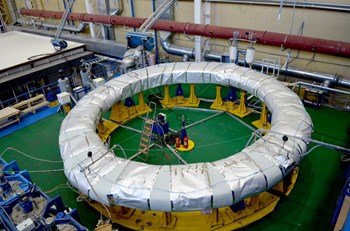ITER NEWSLINE
-
Smallest ring magnet takes shape in Russia
Alexander Petrov, ITER Russia
Smallest ring magnet takes shape in Russia

The first of eight winding packs for poloidal field coil #1 (PF1) undergoes epoxy impregnation at the Srednenevsky Shipbuilding Plant in Saint Petersburg, Russia. The resin—acting inside of a sealed mould and under the effect of heat—hardens the tape to bond each double pancake into a rigid assembly.
The fabrication of poloidal field coil #1 (PF1)—one of ITER's six ring-shaped magnets—is in progress at the Srednenevsky Shipbuilding Plant in Saint Petersburg, Russia, where specialists from JSC "SNSP" and the Efremov Institute (NIIEFA) are winding the second double pancake of the future coil.
Poloidal field coils are built from niobium-titanium (NbTi) superconductors that are wound into flat coils called pancakes. Winding is a multistage process during which conductor from two spools ("double-hand") is wrapped with insulating tape and wound into the dimensions corresponding to each coil.
Because they are key to the successful operation of the machine, the magnets are subject to strict ITER Organization requirements at every stage of the manufacturing process, from qualifying materials to controlling the properties of the finished items. The Russian specialists first received the green light on a full-scale prototype double pancake before starting serial production.
Most of the winding equipment has been designed, manufactured, and tested at the Efremov Institute, which also developed some of the poloidal field coil manufacturing processes; JSC "SNSP" has contributed a number of science-based technologies. In 2014, all equipment was transported to the Srednenevsky Shipbuilding Plant, located in an area which is a well suited to the needs of transporting the completed component.
Eight double pancakes will be stacked to form the final coil, which will weigh 300 tonnes.
return to the latest published articles


